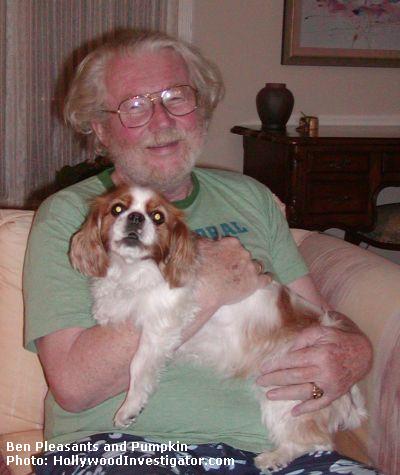PLAYWRIGHT BEN PLEASANTS SHUNS GOVERMENT MONEY
by Thomas M. Sipos, magaging editor [March 26, 2010]
 [HollywoodInvestigator.com] Unlike many playwrights, Los Angeles-based Ben Pleasants won't accept state arts grants. Unlike many plays, those written by Pleasants defy "progressive" dogma. Pleasants believes those two elements go together. In one of his plays, a character tells the audience: "We didn't get any grants for this play. You can do this stuff when you don't get money from the government. You can do anything!" [HollywoodInvestigator.com] Unlike many playwrights, Los Angeles-based Ben Pleasants won't accept state arts grants. Unlike many plays, those written by Pleasants defy "progressive" dogma. Pleasants believes those two elements go together. In one of his plays, a character tells the audience: "We didn't get any grants for this play. You can do this stuff when you don't get money from the government. You can do anything!"
"I am an anarchist," said Pleasants. "I am completely anti-state. I raise my own money with no strings attached. Producers call me frequently about doing my plays. I just meet them face to face. Face to face is better than email. Email plays so nicely into the state. Before long, they'll rewrite it for us. I'm sure they do that in China."
Pleasants's biographical Contentious Minds: The Mary McCarthy/Lillian Hellman Affair was produced in 2002 at Hollywood's Lillian Theatre (starring Jennifer Gundy, Star Trek: Voyager, South of Sunset, and Melissa Jones, Spin City, Primetime Glick). Hellman had been a screenwriter (Watch on the Rhine) who defended Stalin through to her death in 1984.
The play reveals her as a denier of Stalin's Communist Holocaust. It also depicts the irony of Hellman being celebrated today as a victim of HUAC (House Un-American Activities Committee), when instead she was one of its initial supporters.
"I'm attracted to the subject because no one else will say anything," said Pleasants. "Governments would never support a play like this because it brings up issues like the Samuel Dickstein matter. He was the US Representative from New York City who created HUAC to go after German-American Bundists. HUAC was supported strongly by the Left, passed in Congress by 340-42 votes, and had the support of the CPUSA."
Pleasants tackles similar historical themes in The Hemingway/Dos Passos Wars, in which Ernest Hemingway urges leftist writer John Dos Passos not to expose Stalin's murders of his Trotskyite, anarchist, and democratic allies in the Spanish Civil War. Stalinists were fighting a "civil war within a civil war," an event that would inspire George Orwell's Animal Farm and 1984.

"Both plays deal with the coverup in America of Stalin's crimes, by writers like Hellman and John Howard Lawson," said Pleasants. "[They] attacked writers like Dos Passos and Koestler when they attempted to bring forward the murders of their friends, and the torture and execution of others writers in the USSR, like Babel, Bulgakov, and Gorky. What interests me today is why this is not known."
Although both plays' heroes (Dos Passos and McCarthy) are Trotskyites, Pleasants said, "I have no sympathy for either side. I see no difference between Stalin and Trotsky. They were both murderers. If Trotsky had won, he would have taken out Stalin in the same manner."
That HUAC remains a sensitive topic in Hollywood is demonstrated by the uproar over the special Oscar awarded to Elia Kazan (a HUAC friendly witness) in 1999. Yet Contentious Minds pulled no punches in telling its Hollywood audience that, in terms of evil, Stalin's genocide dwarfs the brief prison terms suffered by the Hollywood Ten.
Pleasants was unfazed by Hollywood's reaction. "Variety reviewed Contentious Minds, defended Hellman, and questioned the veracity of what I wrote. NPR's Iris Mann came on opening night to sniff it out, and decided to do nothing. The L.A. Times's Don Shirley told my PR people that they would not review it.
I was glad. When they reviewed my Hemingway play, they put Dos and Hem on the side of the rebels -- which would mean they were fighting for Franco! But, it goes with the territory, as Chomsky says."
Pleasants dedicated Contentious Minds "to Robert Conquest, who, single-mindedly, mapped the vast terrain of Stalin's terror network, making it possible for former Soviet citizens to find out, not only the final resting places of their murdered families, but also the names of their murderers!"
Pleasants believes that his hatred of Communism and Nazism is consistent with his opposition to the war in Iraq and an upcoming war on Iran. "All anarchists are antiwar. They were shot early both in Soviet Russia and in Nazi Germany. I suspect that will happen in the US too, before long. As our great friend, Samuel Edward Konkin III, said over and over, quoting Randolph Bourne, 'War is the health of the state.' "
Pleasants's other plays include Lenin in Love. He is currently working on a trilogy of plays about H. L. Mencken. "They're coming along about as fast as the replacement to the World Trade Center. Mencken is an ideal subject for rediscovery now. He was a true libertarian. Opposed to censorship, open to fresh ideas, at war with bureaucrats in the state, the church and the public weal."
Apart from his plays, Pleasants has written for the L.A. Times, Herald-Examiner, L.A. Free Press, L.A. Vanguard, L.A. Reader, and Los Angeles Magazine. He was a friend to the late poet, Charles Bukowski, who'd nicknamed Pleasants "the Beverly Hills anarchist." Pleasants's recent book, Visceral Bukowski: Inside the Sniper Landscape of L.A. Writers, was published by Sun Dog Press without government money. His most recent novel is Spearmint Leaves.
"Art supported by government rots the artist's soul," said Pleasants. "It's nothing more than the plutocrats' message."
|
